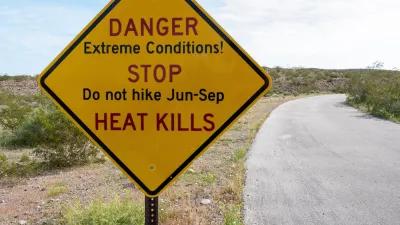Heat is associated with worsened mental health, poorer test scores, and even higher car crash rates.

Extreme heat impacts communities in more ways than we previously thought, according to new research from Boston University’s Center for Climate and Health.
In addition to the expected impacts — dehydration, heat exhaustion, and heat stroke — heat can also endanger pregnant women, impact sleep patterns, and increase irritability, depression, and suicide rates, explaims Kristin Toussaint in Fast Company. “Heat is also associated with higher rates of violence and aggression, including intimate partner violence and gun violence.”
Because of its effect on our phyisological responses, “Extreme heat also affects how well our brains work. High temperatures are associated with poorer test scores, affecting students’ academic performance—an issue that becomes even more apparent among low-income and minority students, whose schools often lack air conditioning.”
Research even shows a link between extreme heat and car crashes. “While there are physical elements at play—the sun might be in drivers eyes, for example, or tires may expand and blow out—research has linked those accidents to impaired judgment, concentration issues, slow reactions, and other driving errors.”
According to Toussaint, “In the U.S., nearly two-thirds of the population lives somewhere vulnerable to extreme summer temperatures. As human-caused climate change worsens, even more people will be exposed to extreme heat and all the health effects that come with it.” This puts extreme heat squarely in the realm of planning issues. Cities can take steps to mitigate the effects of heat, provide cooling centers for residents, and improve infrastructure to handle growing energy needs for cooling.
FULL STORY: Car crashes rise, test scores plummet: The hidden ways extreme heat affects our bodies and our minds

Planetizen Federal Action Tracker
A weekly monitor of how Trump’s orders and actions are impacting planners and planning in America.

Restaurant Patios Were a Pandemic Win — Why Were They so Hard to Keep?
Social distancing requirements and changes in travel patterns prompted cities to pilot new uses for street and sidewalk space. Then it got complicated.

Map: Where Senate Republicans Want to Sell Your Public Lands
For public land advocates, the Senate Republicans’ proposal to sell millions of acres of public land in the West is “the biggest fight of their careers.”

Maui's Vacation Rental Debate Turns Ugly
Verbal attacks, misinformation campaigns and fistfights plague a high-stakes debate to convert thousands of vacation rentals into long-term housing.

San Francisco Suspends Traffic Calming Amidst Record Deaths
Citing “a challenging fiscal landscape,” the city will cease the program on the heels of 42 traffic deaths, including 24 pedestrians.

California Homeless Arrests, Citations Spike After Ruling
An investigation reveals that anti-homeless actions increased up to 500% after Grants Pass v. Johnson — even in cities claiming no policy change.
Urban Design for Planners 1: Software Tools
This six-course series explores essential urban design concepts using open source software and equips planners with the tools they need to participate fully in the urban design process.
Planning for Universal Design
Learn the tools for implementing Universal Design in planning regulations.
Heyer Gruel & Associates PA
JM Goldson LLC
Custer County Colorado
City of Camden Redevelopment Agency
City of Astoria
Transportation Research & Education Center (TREC) at Portland State University
Camden Redevelopment Agency
City of Claremont
Municipality of Princeton (NJ)





























